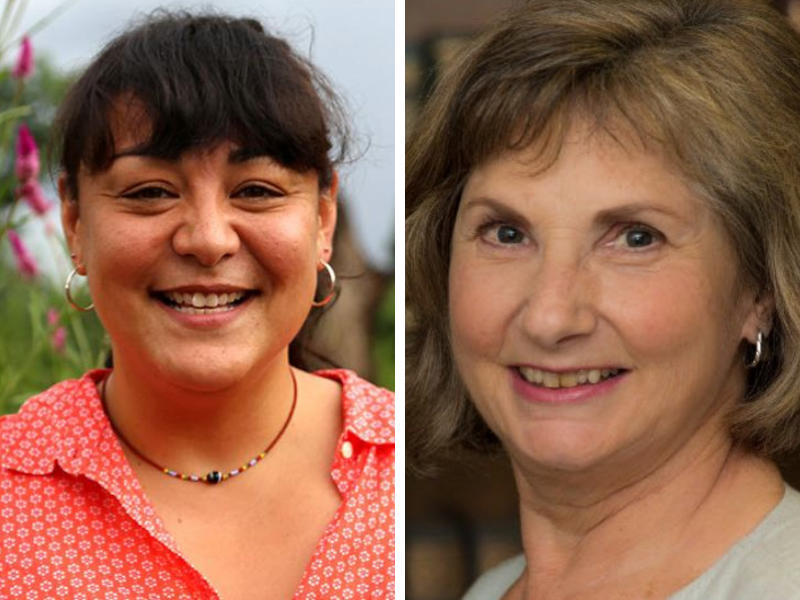Tulane University librarians contribute to the global health crisis response

Dr. Lina Moses (pictured left) is charged with distributing impactful COVID-19 scientific information to the World Health Organization and has enlisted the help of Elaine Hicks (pictured right) from Tulane’s Matas Library of the Health Sciences to help curate the information.
Tulane University faculty member Dr. Lina Moses, a seasoned epidemiologist and disease ecologist in the Tulane School of Public Health and Tropical Medicine, was deployed to Geneva where she worked on the COVID-19 response over the past two months. Receiving daily publication reports, Moses is charged with rapidly distributing the most impactful scientific information to the World Health Organization (WHO) operational response teams. This involves the daily appraisal of a vast amount of critical literature on all aspects of the novel virus relevant to the prevention of infection and the treatment of those infected.
Working with WHO librarians and grad students, Moses is continually finding new information regarding COVID-19. “One of the many elements that are unprecedented about this outbreak is the huge volume of publications coming out,” she noted. “Right now, it is about getting the right information to the right teams as quickly as possible.”
In their standard form, these publication reports lack details needed for a rapid review of the high volume of scientific information being generated. While a new format is being developed by WHO and the National Library of Medicine, Moses has a short-term information need, which is best met by health science librarians.
“Librarians are in a unique position to use our knowledge and skills to participate in a response role.”
- Elaine Hicks
With so much information to digest and curate, Moses reached out for support from Elaine Hicks, her liaison from the Rudolph Matas Library of the Health Sciences at Tulane. Hicks, who holds a Master’s in Public Health from Tulane, in addition to her degree in Library and Information Science, created the Librarian Reserve Corps (LRS), a health science librarian version of the Medical Reserve Corps (MRS). The MRS is a national network of volunteers organized locally to improve the health and safety of their communities.
Four days after distributing a survey to the Medical Library Association, 120 librarians from the United States, Canada, Germany, Australia and Trinidad volunteered to help Moses meet her goals, including Matas Research Support librarian Amy Corder and Alicia Livinski (PHTM’02), an informationist at the National Institutes of Health Library.
Teams have formed groups based on the six WHO pillars of clinical characterization and care, clinical trials for therapeutics, diagnostics, infection prevention and control, risk communication and community engagement and human and animal interface.
Moses is supported by several Tulane students and alumni affiliated with the SPHTM, including Caroline A. Habrun (Doctor of Veterinary Medicine), Jeni A. Stolow (PhD candidate, and member of the Global Outbreak and Alert Response Network (GOARN) risk management pillar) and Emma B. Ortega, a master’s degree candidate. LRS volunteers have organized an incident command system of four workgroups that continue to respond to requested searches and modify the publication list format. Moses then reviews this work and distributes it to the WHO’s GOARN Operational Pillar leads.
“Librarians are in a unique position to use our knowledge and skills to participate in a response role.” Hicks said. “The Library Research Corps is a global librarian crowdsourcing approach to an immediate information need.”
Other Tulane librarians are proving to be crucial during this time as well. After announcing the temporary closure of Tulane library facilities, Dean David Banush informed health science researchers that Tulane library resources and librarians would remain available online to assist them in their work despite the closure of many campus facilities.
Banush’s offer was taken up within minutes by Dr. Dahleen Fusco, assistant professor in the Department of Infectious Diseases at Tulane’s School of Medicine, who is seeing patients and is heavily involved in an observational COVID-related clinical study at Tulane. She requested two articles about a class of drugs with potential as a treatment for COVID-19. Keith Pickett, a research support librarian at Matas Library, was able to send her that information in minutes so her work could continue seamlessly.
“Tulane health sciences depend on our libraries for rapid access to vetted, reliable information,” Banush said. “It is especially gratifying to see our librarians helping to keep critical Tulane research moving even in times of crisis.”
Another Tulanian who is sending out crucial coronavirus information on a daily basis is Clay Christian, a business development officer at the School of Medicine, who oversees the production and dissemination of the SOM COVID19 Daily Digest, an e-newsletter that contains scientific literature (published papers and preprints) and the news (scientific and general news sources) updates about COVID19.
To learn more about Tulane Libraries’ resources and services, visit library.tulane.edu.
